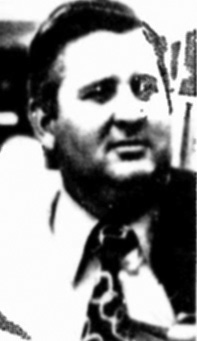Jim C. Parsons: Difference between revisions
No edit summary |
No edit summary |
||
| (3 intermediate revisions by the same user not shown) | |||
| Line 4: | Line 4: | ||
Parsons left high school to join the Navy at age 17. He served in Japan and Korea before his [[1954]] discharge, and earned his general equivalency degree along the way. He joined the Birmingham police that year and also enrolled at [[Massey Business College]] to study business law and accounting. He was promoted to Detective in [[1962]], to Sergeant in [[1963]], and to Lieutenant in [[1966]]. In [[1967]] he returned to college, studying sociology at [[UAB]]. | Parsons left high school to join the Navy at age 17. He served in Japan and Korea before his [[1954]] discharge, and earned his general equivalency degree along the way. He joined the Birmingham police that year and also enrolled at [[Massey Business College]] to study business law and accounting. He was promoted to Detective in [[1962]], to Sergeant in [[1963]], and to Lieutenant in [[1966]]. In [[1967]] he returned to college, studying sociology at [[UAB]]. | ||
When he was promoted from from Captain to Chief by [[George Seibels]] after [[Jamie Moore]]'s retirement in [[1972]], Parsons stated that he recognized that policemen were responsible for more than just maintaining law and order, but also needed to engage with community problems before they erupted into criminal activity. | When he was promoted from from Captain to Chief by [[George Seibels]] after [[Jamie Moore]]'s retirement in [[1972]], Parsons stated that he recognized that policemen were responsible for more than just maintaining law and order, but also needed to engage with community problems before they erupted into criminal activity. He established the department's Internal Affairs division. | ||
Parsons left | With a letter of recommendation to New Orleans Mayor Dutch Morial from then-Councilman [[Richard Arrington]], Parsons left to serve as chief of the New Orleans Police Department in [[1978]]. He resigned after two and a half years, however, amidst a controversy over the deaths of several suspects in the murder of a police officer there. He returned to Alabama in [[1981]] and was considered a leading candidate to resume his position as head of the Birmingham Police Department, succeeding [[Bill Myers]], but was passed over in favor of New York police captain [[Arthur Deutsch]]. In retirement Parsons conducted private investigations for a law firm. | ||
Parsons died in [[2013]] and is buried at [[Bivens Chapel Cemetery]] in [[Brookside]]. | Parsons died in [[2013]] and is buried at [[Bivens Chapel Cemetery]] in [[Brookside]]. | ||
| Line 18: | Line 18: | ||
==References== | ==References== | ||
* "New Police Chief for Birmingham" (August 17, 1972) ''Gadsden Times'' | * "New Police Chief for Birmingham" (August 17, 1972) ''Gadsden Times'' | ||
* {{Arrington-2008}} | |||
* Robinson, Carol (June 5, 2013) "Former Birmingham Police Chief Jim Parsons dead at 79." {{BN}} | * Robinson, Carol (June 5, 2013) "Former Birmingham Police Chief Jim Parsons dead at 79." {{BN}} | ||
| Line 23: | Line 24: | ||
[[Category:1933 births]] | [[Category:1933 births]] | ||
[[Category:2013 deaths]] | [[Category:2013 deaths]] | ||
[[Category:GED holders]] | |||
[[Category:US Navy personnel]] | [[Category:US Navy personnel]] | ||
[[Category:Korean War veterans]] | [[Category:Korean War veterans]] | ||
Latest revision as of 10:58, 30 November 2018
James C. Parsons (born c. 1933; died June 5, 2013 at Brookwood Medical Center) was the 28th Chief of the Birmingham Police Department.
Parsons left high school to join the Navy at age 17. He served in Japan and Korea before his 1954 discharge, and earned his general equivalency degree along the way. He joined the Birmingham police that year and also enrolled at Massey Business College to study business law and accounting. He was promoted to Detective in 1962, to Sergeant in 1963, and to Lieutenant in 1966. In 1967 he returned to college, studying sociology at UAB.
When he was promoted from from Captain to Chief by George Seibels after Jamie Moore's retirement in 1972, Parsons stated that he recognized that policemen were responsible for more than just maintaining law and order, but also needed to engage with community problems before they erupted into criminal activity. He established the department's Internal Affairs division.
With a letter of recommendation to New Orleans Mayor Dutch Morial from then-Councilman Richard Arrington, Parsons left to serve as chief of the New Orleans Police Department in 1978. He resigned after two and a half years, however, amidst a controversy over the deaths of several suspects in the murder of a police officer there. He returned to Alabama in 1981 and was considered a leading candidate to resume his position as head of the Birmingham Police Department, succeeding Bill Myers, but was passed over in favor of New York police captain Arthur Deutsch. In retirement Parsons conducted private investigations for a law firm.
Parsons died in 2013 and is buried at Bivens Chapel Cemetery in Brookside.
| Preceded by: Jamie Moore |
Chief of Birmingham Police Department 1972-1978 |
Succeeded by: Bill Myers |
References
- "New Police Chief for Birmingham" (August 17, 1972) Gadsden Times
- Arrington, Richard (2008) There's Hope for the World: The Memoir of Birmingham, Alabama's First African-American Mayor Tuscaloosa: University of Alabama Press
- Robinson, Carol (June 5, 2013) "Former Birmingham Police Chief Jim Parsons dead at 79." The Birmingham News
